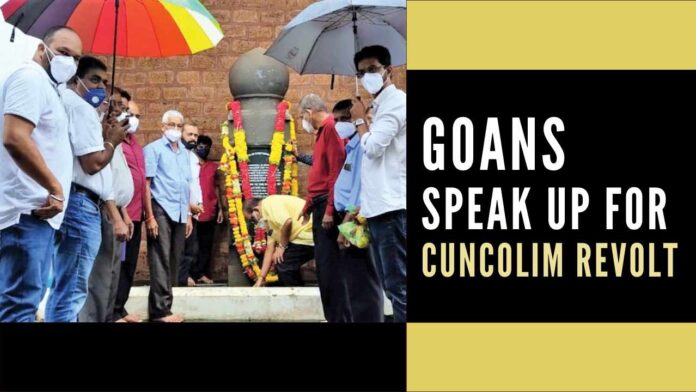
Goa Cuncolkars want 1583 revolt in school books for future generations
After Goa Chief Minister Pramod Sawant announced the commemoration of the July 15, 1583, Cuncolim revolt at the National War Memorial in New Delhi every year, a section of society is demanding its inclusion in the history textbooks as well as celebrating the day as a state event.
Notably, the people of Goa have been demanding for the last 20 years the inclusion of the Cuncolim revolt of 1583 against Portuguese colonial rule in the history textbooks, so that the sacrifice of the martyrs are known to the future generations.
In this revolt, a European Jesuit priest and other priests were killed for converting people and in retaliation, the Portuguese executed the chieftains of Cuncolim through trickery by inviting them on the pretext of parleys.
The way the first war of independence in 1857 assumed significance for the freedom struggle, July 15, 1583, also played a major role in Goa’s liberation by starting a revolt against Portuguese colonial rule. Goa was the first to revolt against colonial rule and was liberated post-independence of India. The struggle of 450 years to liberate the tiny state from colonial rule bore fruit on 19 December 1961, when it was liberated by the Indian forces.
During the Cuncolim revolt, villagers had killed Roman Catholic priests and their armed escorts, who were in the process of converting villagers and desecrating Hindu temples in the region. One of those killed was European Jesuit priest Rodolfo Acquaviva, who was in the Court of Emperor Akbar just before he was sent to Goa.
The massacre led to swift retaliation by the Portuguese, who invited around 16 chieftains from Cuncolim and the adjoining villages of Ambelim, Assolna, Veroda, and Velim to the Assolna fort for parleys and killed them. One of the chieftains escaped the massacre by jumping from the fort wall into the river and swimming to Karwar in Karnataka, where he took shelter.
In 2012, then Chief Minister Manohar Parrikar had assured the State Assembly that he was keen on appointing a panel of historians to study the issue. Goa Chief Minister Pramod Sawant in 2019 had also assured to include this revolt in the history books in the schools of Goa.
Now, along with freedom fighters, their families, villagers, and religious organizations have also pitched in for the inclusion of the revolt in textbooks, which according to them will help to inform the future generations.
President of the Cuncolim Chieftains Memorial Committee Oscar Martins said that the government should include full details of the ‘Cuncolim Revolt’ in the history textbooks.
“For the last twenty years, we are submitting a memorandum to every Chief Minister. But so far nothing has been done about it. We welcome the decision of the government to commemorate this day at the National War Memorial (in New Delhi) every year,” Martins said.
[With Inputs from IANS]
PGurus is now on Telegram. Click here to join our channel and stay updated with all the latest news and views
For all the latest updates, download PGurus App.
- PM Modi launches another scathing attack on Congress; says ‘Rajiv Gandhi scrapped inheritance law to save family property’ - April 25, 2024
- TN: ED questions five district collectors in illegal sand mining case - April 25, 2024
- ECI issues show cause notice over alleged MCC violations by PM Modi, Rahul Gandhi; seeks response from BJP, Congress chief - April 25, 2024










